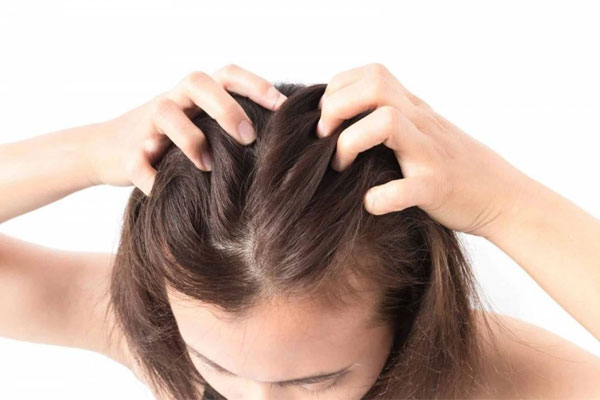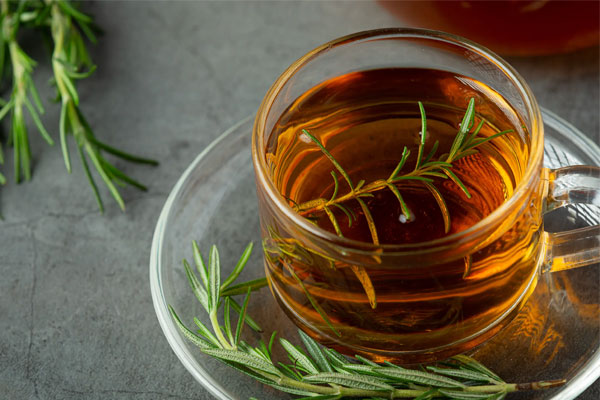Blogs
Does drinking rosemary tea increase hair growth?
Rosemary tea has gained popularity not only for its pleasant aroma and potential health benefits but also for its rumored ability to support hair growth. In recent years, more people have been turning to natural remedies to improve hair health and combat issues like thinning and hair loss. Among these remedies, rosemary has been widely used in traditional medicine, particularly in the form of essential oil applied to the scalp. However, a common question remains: Can drinking rosemary tea actually promote hair growth?
This article explores the potential connection between rosemary tea and hair growth, examining its nutritional properties, scientific evidence, and the best ways to incorporate it into a hair care routine.

Understanding hair growth
Hair growth is a complex biological process influenced by various factors, including genetics, diet, hormones, and overall health. To understand how rosemary tea might support hair growth, it’s essential to first look at the hair growth cycle and the key factors that affect it.
The hair growth cycle
Hair grows in a continuous cycle with three main phases:
- Anagen (Growth phase): This is the active phase where hair follicles produce new hair. It can last anywhere from 2 to 7 years, depending on genetics.
- Catagen (Transition phase): A short phase (about 2 weeks) where hair stops growing, and the follicle begins to shrink.
- Telogen (Resting phase): The final phase, lasting around 3 to 4 months, where hair sheds naturally, making way for new growth.
Disruptions in this cycle—such as stress, poor nutrition, or hormonal imbalances—can lead to excessive hair shedding or slowed hair growth.
Factors that affect hair growth
Several factors influence the speed and quality of hair growth, including:
- Genetics: Determines hair thickness, length potential, and growth rate.
- Nutrition: Essential vitamins and minerals (like biotin, iron, and antioxidants) play a crucial role in maintaining healthy hair.
- Hormonal balance: Hormones like DHT (dihydrotestosterone) can contribute to hair loss, especially in men.
- Scalp health: A well-nourished, clean scalp promotes better hair growth.
- Blood circulation: Good blood flow to hair follicles delivers oxygen and nutrients necessary for growth.
Given these factors, it’s important to explore whether rosemary tea can positively impact the hair growth process by improving circulation, reducing inflammation, or providing essential nutrients.
Nutritional and medicinal properties of rosemary
Rosemary (Rosmarinus officinalis) is an aromatic herb widely used in cooking and traditional medicine. It is packed with beneficial compounds that contribute to overall health, including potential benefits for hair growth. Understanding its nutritional and medicinal properties can help determine whether drinking rosemary tea may support healthier hair.
Key nutrients and bioactive compounds
Rosemary contains several powerful compounds that may play a role in hair health:
- Antioxidants (Rosmarinic acid, Carnosic acid, Carnosol): Help protect hair follicles from oxidative stress, which can contribute to hair thinning and loss.
- Ursolic acid: Known to improve blood circulation to the scalp, potentially stimulating hair follicles.
- Anti-inflammatory agents: Reduce scalp inflammation, which can lead to improved hair growth conditions.
- Essential vitamins and minerals: Contains small amounts of vitamin C, iron, and calcium, which are essential for hair strength and growth.
Rosemary’s traditional use in hair care
For centuries, rosemary has been used in various forms to promote hair health:
- Rosemary essential oil: Applied topically, it has been shown to improve scalp circulation and promote hair regrowth.
- Rosemary infusions and rinses: Used to strengthen hair, reduce dandruff, and enhance shine.
- Rosemary tea: Consumed as a herbal remedy to support overall wellness, which may indirectly contribute to healthier hair.
Potential benefits for hair growth
- Stimulates blood flow: Better circulation to the scalp can nourish hair follicles and promote growth.
- Blocks DHT: Some research suggests rosemary may help reduce levels of dihydrotestosterone (DHT), a hormone linked to hair loss.
- Fights free radicals: Antioxidants help protect hair from environmental damage and premature thinning.
- Supports scalp health: Anti-inflammatory and antimicrobial properties may prevent scalp conditions like dandruff, which can hinder growth.
While rosemary has long been valued for its potential hair benefits, the next step is to explore whether drinking rosemary tea—rather than just using it topically—can directly influence hair growth.
How drinking rosemary tea might support hair growth
While rosemary essential oil is well-known for its hair benefits when applied topically, drinking rosemary tea may also contribute to hair growth through its internal effects on the body. The compounds found in rosemary tea can help improve circulation, reduce inflammation, balance hormones, and provide antioxidant support—factors that all play a role in maintaining healthy hair.
- Improves blood circulation: Good blood flow is essential for delivering oxygen and nutrients to hair follicles, which helps stimulate growth. Rosemary contains ursolic acid, which is known to improve circulation. By drinking rosemary tea, the body may experience enhanced blood flow, including to the scalp, promoting stronger and healthier hair.
- Provides antioxidant protection: Oxidative stress caused by free radicals can weaken hair follicles and contribute to thinning or hair loss. Rosemary tea is rich in antioxidants like rosmarinic acid and carnosic acid, which help protect hair follicles from damage and support overall hair health.
- May help block DHT (Dihydrotestosterone): DHT is a hormone linked to hair loss, especially in conditions like androgenetic alopecia (pattern baldness). Some studies suggest that rosemary may help inhibit DHT production, reducing its negative impact on hair follicles. While most research has focused on topical application, drinking rosemary tea may provide similar benefits by supporting hormonal balance.
- Reduces inflammation and supports scalp health: Inflammation of the scalp can lead to hair thinning, dandruff, and weakened hair follicles. Rosemary has natural anti-inflammatory properties, which may help soothe the scalp from the inside out when consumed as tea. A healthier scalp environment can create better conditions for hair growth.
- Helps reduce stress and supports relaxation: Chronic stress can contribute to hair loss by increasing cortisol levels, which disrupt the hair growth cycle. Rosemary tea has calming properties that may help reduce stress and anxiety, indirectly supporting hair growth by keeping stress-related hair shedding under control.
- Supports overall hair health through nutrients: Drinking rosemary tea provides small amounts of essential vitamins and minerals, such as iron and calcium, which are necessary for strong and healthy hair. While not a primary source of these nutrients, incorporating rosemary tea into a balanced diet may contribute to improved hair health over time.
Although research on the direct effects of drinking rosemary tea for hair growth is still limited, its beneficial properties suggest that it may be a useful addition to a natural hair care routine.
Scientific evidence and studies
While rosemary has been widely used in traditional medicine for hair growth, scientific research on the effects of drinking rosemary tea specifically is still limited. However, several studies suggest that rosemary’s bioactive compounds may support hair health and growth, particularly through its impact on circulation, inflammation, and hormone regulation.
Studies on rosemary and hair growth
- Rosemary oil vs. minoxidil (2015 study)
A well-known study published in Skinmed in 2015 compared the effects of rosemary essential oil and 2% minoxidil (a common hair growth treatment) on patients with androgenetic alopecia (pattern baldness). After six months, both groups showed significant hair growth, with rosemary oil performing just as effectively as minoxidil. Additionally, the rosemary oil group experienced less scalp itching, suggesting it could be a gentler alternative.
Implication for rosemary tea: While this study focused on topical application, it supports rosemary’s ability to promote hair growth. Drinking rosemary tea may offer similar benefits by improving circulation and reducing inflammation internally.
- Antioxidant and anti-inflammatory properties (2017 study)
A study published in Evidence-Based Complementary and Alternative Medicine found that rosemary extract contains high levels of antioxidants and anti-inflammatory compounds. These properties help protect hair follicles from oxidative stress, which can lead to hair loss.
Implication for rosemary tea: Since rosemary tea contains the same beneficial compounds as rosemary extract, it may help prevent hair thinning by reducing oxidative damage.
- DHT inhibition (2013 study)
Research in Phytotherapy Research indicated that rosemary extract could help block DHT (dihydrotestosterone), a hormone linked to hair loss. DHT causes hair follicles to shrink over time, leading to thinning and eventual hair loss. By inhibiting DHT, rosemary may help slow or prevent hair loss.
Implication for rosemary tea: Drinking rosemary tea may contribute to hormonal balance, reducing DHT levels and promoting a healthier hair growth cycle.
The need for more research
While these studies suggest that rosemary has hair growth-promoting properties, most research has focused on its topical use. There is currently little direct scientific evidence proving that drinking rosemary tea alone can significantly impact hair growth. However, given its circulation-boosting, antioxidant, and anti-inflammatory properties, rosemary tea may still play a supportive role in maintaining healthy hair.
Future studies are needed to determine the specific effects of rosemary tea on hair growth, but existing research suggests that incorporating rosemary—whether through topical application or tea consumption—can be beneficial for overall hair health.
How to use rosemary tea for hair health
Incorporating rosemary tea into your routine can be a natural and easy way to support hair health. While more research is needed to confirm its direct effects on hair growth, drinking rosemary tea and using it as a hair rinse may provide benefits through improved circulation, reduced inflammation, and antioxidant protection.
Drinking rosemary tea for hair health
How to make rosemary tea:
- Ingredients:
- 1 to 2 teaspoons of dried rosemary leaves (or a few fresh sprigs)
- 1 cup of boiling water
- Optional: honey, lemon, or other herbs for flavor
- Instructions:
- Boil water and add rosemary leaves.
- Let it steep for 5–10 minutes.
- Strain and enjoy warm or cold.
Recommended intake:
- Drink 1–2 cups per day for potential hair benefits.
- Consistency is key—regular consumption over several weeks or months may yield the best results.
Using rosemary tea as a hair rinse
How to make a rosemary hair rinse:
- Brew a stronger batch of rosemary tea using 2–3 teaspoons of dried rosemary in 2 cups of boiling water.
- Let it steep for 15–20 minutes, then cool to room temperature.
- After shampooing, pour the rosemary tea over your scalp and hair as a final rinse.
- Gently massage it into your scalp and leave it on for a few minutes before rinsing with cool water (or leave it in for added benefits).
Benefits of a rosemary hair rinse:
- May improve scalp circulation.
- Can reduce dandruff and excess oil production.
- Helps strengthen hair and add shine.
Combining rosemary tea with other hair-boosting ingredients
For enhanced benefits, you can pair rosemary tea with:
- Nettle tea – for additional DHT-blocking and nutrient support.
- Peppermint tea – to further stimulate blood circulation to the scalp.
- Hibiscus tea – rich in vitamins that promote hair growth and prevent premature graying.
Precautions and considerations
- Allergies & Sensitivities: Some people may be sensitive to rosemary. Discontinue use if you experience irritation or digestive discomfort.
- Pregnancy & Medical conditions: Pregnant women and individuals with certain medical conditions (like high blood pressure or epilepsy) should consult a doctor before consuming large amounts of rosemary tea.
- Balance with a healthy diet: Rosemary tea alone won’t guarantee hair growth—ensure you also follow a balanced diet rich in essential vitamins and minerals for optimal hair health.

Conclusion
While scientific research on drinking rosemary tea for hair growth is still limited, its well-documented benefits—such as improved circulation, antioxidant protection, anti-inflammatory effects, and potential DHT-blocking properties—suggest that it may support overall hair health. Many studies have shown that rosemary can promote hair growth when applied topically, and drinking rosemary tea may provide similar advantages by nourishing the body from within.
Incorporating rosemary tea into your routine is a simple, natural way to enhance scalp health and strengthen hair. Regular consumption, combined with a balanced diet and proper hair care, may contribute to healthier, shinier, and more resilient hair over time.
While rosemary tea is generally safe for most people, it’s important to consume it in moderation and consult a healthcare professional if you have any underlying medical conditions. Though it may not be a miracle cure for hair loss, rosemary tea can be a valuable addition to a holistic approach to maintaining strong and healthy hair.
